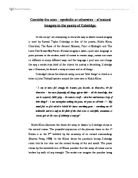Romney Leigh sees nothing in Aurora which resembles any of these attributes for as he says, “We get no Christ from you.” (II.224) As a writer, Aurora fails to conform to the ideal woman, wife and mother as it has been constructed by patriarchy, rather she embodies an otherness which is in complete contrast to this ideal.
However, Romney even refuses to give her credit for her writing because he feels her lack of womanly virtue destroys her credibility as an artist, “and verily/We shall not get a poet, in my mind.” (II.224-5) Clearly, Romney views Aurora’s otherness as an impediment to her skills as a writer because he believes she is unable to act like a woman was expected to be. This notion is revealed further when Romney accuses the ‘woman artist’ of trying to be a “prophet,” who is attempting to “teach the living” about “things” which woman cannot “understand.” What Romney means is that women are supposedly only “sympathetic to the personal” woes in life, whereas men are capable of sympathizing with a more “universal anguish” and “general suffering” in the world. (II.181-199) He tells Aurora:
“You weep for what you know. A red-haired child
Sick in fever, if you touch him once,
Though but so little as with a finger-tip,
Will set you weeping; but a million sick ...
You could as soon weep for the rule of three
Or compound fractions.” (II.213-18)
This reveals not only Romney’s patronizing symbolic judgement of the ‘woman artist’ being incapable of experiencing any emotion with regard to the greater, and in his view, far more important issues in life, but also that all women are incapable of having these feelings which is why he believes women do not make good writers. In Romney’s judgment, all women are selfish and not do feel anything for the wider and more important issues. He says that since this is a “world/Uncomprehended” by women, then the world should remain “Uninfluenced” by women. (II.218-20)
Since Romney Leigh perceives women to be outside the realm of true human emotion, he even sees them as not human. Indeed, Romney’s symbolic judgment of ‘women’artists’ is that they are like beasts for Aurora is described as “a grand wild creature of the woods,” who “hate[s] the stall built for” her. (II.1098/9) In other words, Aurora is like a horse. This bestial image places Aurora outside of the social norm and implies patriarchy’s view of the alterity of the ‘woman artist’. In addition, the image of the horse is a very sensual image. In Jungian psychoanalytic symbolism, the horse is linked with human sexuality. It suggests that women who take up the phallic pen and write are guilty of public sexuality and those who indulge in displays of public sexuality lie outside of Victorian society.
Lady Waldemar, also views the ‘woman artist’ in bestial terms, for she refers to Aurora as a “lioness.” (III.529) Therefore implying that in working as a writer, Aurora is behaving in a wild and uncivilised manner and that she needs to be secured “with a trap.” (III.385) In other words, reined in like a wild horse and be forced to conform to Victorian/patriarchal values: to behave as women are expected to behave. Consequently, Lady Waldemar betrays her sex by conforming to the patriarchal view of the alterity of the ‘woman artist’: “You stand outside,/You artist women, of the common sex.” (III.406/7) In other words, she appears to be suggesting the ‘woman artist’ behaves like a man and not like a woman.
Furthermore, in Lady Waldemar’s view the ‘woman artist’ feeds her mind and thoughts, like a man but starves her body and feelings which are equated with femininity:
“Perhaps by what you’re mulcted in, your hearts
Being starved to make your heads.” (III.410/11)
Lady Waldemar is not suggesting the ‘woman artist’ is being viewed as a man, but simply displaying male characteristics. In other words, in contrast to Romney’s view, Lady Waldemar believes Aurora is starving her heart and not feeling emotions which she equates with the feminine. Instead, Aurora is acting like a man and using her head: thinking and not feeling. Whilst Lady Waldemar accepts that the ‘woman artist’ is undoubtedly also female, what she is implying is that the ‘woman artist’ appears to be of both sexes, in other words: asexual. It is the ‘woman artist’s’ asexuality that makes her different to the norm as it was perceived to be in Victorian society. It is precisely because Aurora and ‘women artists’ like her, have entered into the male sphere that both Romney and Lady Waldemar perceive their otherness, their alterity to society which is uncompromising in its view of the sexes and the roles they are supposed to play.
Therefore, as I have shown the alternity of the woman writer is shown through the speeches of both Romney Leigh and Lady Waldemar when expressing their views about Aurora’s writing endeavours. A ‘woman artist’ is working in a man’s world. As far as both Romney and Lady Waldemar are concerned this is an ‘impertinence’ because in Victorian society working as a writer is viewed to be a man’s prerogative. Romney believes women do not have the capacity to feel emotion for the wider and more important issues, whereas Lady Waldemar believes Aurora is focussing on her capacity to think, viewed as a male trait, as opposed to feeling, which Lady Waldemar sees as the female trait. Both Romney and Lady Waldemar use bestial imagery to describe Aurora suggesting she is outside of what is considered normal by Victorian society. Lady Waldemar perceives Aurora as neither man or woman, but as asexual because she appears to embody both sexes in one being. This difference to the norm is what defines the ‘woman artist’ in her state or condition of otherness.







